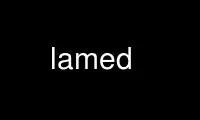
This is the command lamed that can be run in the OnWorks free hosting provider using one of our multiple free online workstations such as Ubuntu Online, Fedora Online, Windows online emulator or MAC OS online emulator
PROGRAM:
NAME
aleph - extended Unicode TeX
SYNOPSIS
aleph [options] [&format] [file|\commands]
DESCRIPTION
Run the Aleph typesetter on file, usually creating file.dvi. If the file argument has no
extension, ".tex" will be appended to it. Instead of a filename, a set of Aleph commands
can be given, the first of which must start with a backslash. With a &format argument
Aleph uses a different set of precompiled commands, contained in format.fmt; it is usually
better to use the -fmt format option instead.
Aleph is a version of the TeX program modified for multilingual typesetting. It uses
Unicode, and has additional primitives for (among other things) bidirectional typesetting.
Aleph's command line options are similar to those of TeX.
Aleph is no longer being actively developed; see LuaTeX for current activity.
OPTIONS
Run aleph --help to see the complete list of options; this is not exhaustive.
--fmt format
Use format as the name of the format to be used, instead of the name by which Aleph
was called or a %& line.
--halt-on-error
Exit with an error code when an error is encountered during processing.
--help Print help message and exit.
--ini Be `initial' Aleph for dumping formats; this is implicitly true if the program is
called as inialeph.
--interaction mode
Sets the interaction mode. The mode can be one of batchmode, nonstopmode,
scrollmode, and errorstopmode. The meaning of these modes is the same as that of
the corresponding \commands.
--ipc Send DVI output to a socket as well as the usual output file. Whether this option
is available is the choice of the installer.
--ipc-start
As --ipc, and starts the server at the other end as well. Whether this option is
available is the choice of the installer.
--kpathsea-debug bitmask
Sets path searching debugging flags according to the bitmask. See the Kpathsea
manual for details.
--maketex fmt
Enable mktexfmt, where fmt must be one of tex or tfm.
--no-maketex fmt
Disable mktexfmt, where fmt must be one of tex or tfm.
--output-comment string
Use string for the DVI file comment instead of the date.
--output-directory directory
Write output files in directory instead of the current directory. Look up input
files in directory first, the along the normal search path.
--parse-first-line
If the first line of the main input file begins with %& parse it to look for a dump
name.
--progname name
Pretend to be program name. This affects both the format used and the search
paths.
--recorder
Enable the filename recorder. This leaves a trace of the files opened for input
and output in a file with extension .ofl. (This option is always on.)
--shell-escape
Enable the \write18{command} construct. The command can be any Bourne shell
command. By default, this construct is enabled in a restricted mode, for security
reasons.
--version
Print version information and exit.
ENVIRONMENT
See the Kpathsearch library documentation (the `Path specifications' node) for precise
details of how the environment variables are used. The kpsewhich utility can be used to
query the values of the variables.
One caveat: In most Aleph formats, you cannot use ~ in a filename you give directly to
Aleph, because ~ is an active character, and hence is expanded, not taken as part of the
filename. Other programs, such as Metafont, do not have this problem.
TEXMFOUTPUT
Normally, Aleph puts its output files in the current directory. If any output file
cannot be opened there, it tries to open it in the directory specified in the
environment variable TEXMFOUTPUT. There is no default value for that variable.
For example, if you say tex paper and the current directory is not writable, if
TEXMFOUTPUT has the value /tmp, Aleph attempts to create /tmp/paper.log (and
/tmp/paper.dvi, if any output is produced.) TEXMFOUTPUT is also checked for input
files, as TeX often generates files that need to be subsequently read; for input,
no suffixes (such as ``.tex'') are added by default, the input name is simply
checked as given.
TEXINPUTS
Search path for \input and \openin files. This should start with ``.'', so that
user files are found before system files. An empty path component will be replaced
with the paths defined in the texmf.cnf file. For example, set TEXINPUTS to
".:/home/user/tex:" to prepend the current direcory and ``/home/user/tex'' to the
standard search path.
TEXEDIT
Command template for switching to editor. The default, usually vi, is set when
Aleph is compiled.
NOTES
This manual page is not meant to be exhaustive. The complete documentation for this
version of Aleph can be found in the info manual Web2C: A TeX implementation. See
http://tug/org/web2c.
Use lamed online using onworks.net services
